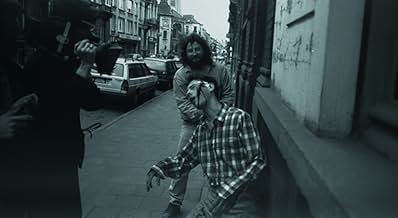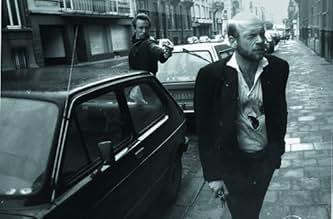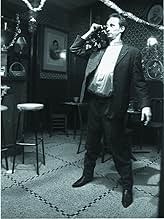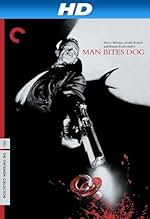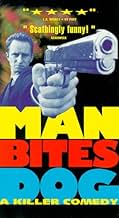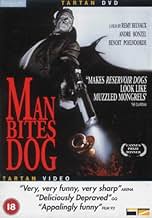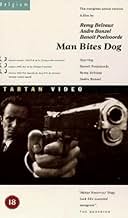PUNTUACIÓN EN IMDb
7,4/10
45 mil
TU PUNTUACIÓN
Un equipo de filmación sigue a un ladrón despiadado y un asesino despiadado en su rutina diaria. El equipo de filmación pierde su objetividad y comienza a echar una mano.Un equipo de filmación sigue a un ladrón despiadado y un asesino despiadado en su rutina diaria. El equipo de filmación pierde su objetividad y comienza a echar una mano.Un equipo de filmación sigue a un ladrón despiadado y un asesino despiadado en su rutina diaria. El equipo de filmación pierde su objetividad y comienza a echar una mano.
- Premios
- 7 premios y 5 nominaciones en total
Jacqueline Poelvoorde-Pappaert
- Ben's Mother
- (as Jacqueline Poelvoorde Pappaert)
Édith Le Merdy
- Nurse
- (as Edith Lemerdy)
Argumento
¿Sabías que...?
- CuriosidadesDue to budget problems, it took the filmmakers over a year to complete the film. The company ran out of money several times and shooting had to be postponed until more money could be raised. A lot of friends and family of the filmmakers contributed to the film, both behind and in front of the cameras.
- PifiasAt the beginning, Benoît says that four times a child's body weight is needed to sink a dead child. However, at the bar where they drink Dead Baby Boys, Benoît asks René for the weight ratio needed to sink a child, to which René replies "Twice," and Benoit says, "Right!"
- Versiones alternativasENDING SPOILERS - In some versions, the final shot, where everyone dies, lasts until the film runs out of the camera, which leaves a blank white screen after the film slips out of the camera's gate. In other versions, there is a dissolve between the the final shot and the blank screen at a much sooner point--and the viewer does not see the film slip out of the gate. The Criterion Collection edition released in 2002 has the latter version of the final shot.
- ConexionesFeatured in Zomergasten: Episodio #12.2 (1999)
- Banda sonoraIce Ice Baby
Written by David Bowie, Earthquake (as Floyd Brown), John Deacon, Mario 'Chocolate' Johnson (as Mario Johnson), Brian May, Freddie Mercury, Roger Taylor & Vanilla Ice (as Robert Van Winkle)
Performed by Vanilla Ice
Courtesy of Capitol Records, LLC
Contains a sample of "Under Pressure"
Performed by Queen & David Bowie
Courtesy of Hollywood Records, Inc. for USA & Canada and Courtesy of Island Records
Under license from Universal Music Enterprises
Reseña destacada
This movie is a piece of art: shocking and disturbing, while at the same time funny as hell in a raw "should-I-be-laughing-or-should-I-be-ashamed" kind of way.
It gives an insight in the very realistically portrayed life of Ben, a serial killer with an impressionable charisma.
Most people who commented on this film either love it or hate it. The division seems mostly geographical though: most Americans can't seem to understand the tongue-in- cheekness of this movie.
Probably it has to do with the fake-documentary nature of the movie, which is clearly western-european. Anyone who has ever seen American documentaries knows they have a different pace and way of treating images. Those who are used to belgian/french/ dutch/german documentaries will recognise the style of the so-called "intimate" documentaries.
The pivotal point is the moment a relationship develops "beyond" the documentary relationship of the filmmakers and their subject (they take Ben's money to finish the movie).
When watching this movie, try to imagine that this *could* be a real movie:
documentaries about terrorists, drugdealers, and even mercenaries (the closest thing to an actual serial killer) have been made, and some of them were very close to their subject.
It is *not* a "black comedy" in the classical sense of the word; more like a "Clockwork Orange" for the nineties. Where "A Clockwork Orange" bathed in the design of the seventies, this movie bathes in the "larger-than-life" invasiveness of modern-day reality-tv-style television. Anyone who has seen shows like "cops" or "Big Brother" will know what I'm talking about. It asks the big documentary question: in how far does the observed change the observer? It makes a statement, not about violence, but about the observer of violence. The way it is portrayed shows the art of the (very low-budget) crew: it grips your guts without fancy effects or gory protrayal of gore: it shows fear, despair and psychological emptyness, by showing emotions! This should be recommended viewing (and debating) to anyone making documentary films.
It gives an insight in the very realistically portrayed life of Ben, a serial killer with an impressionable charisma.
Most people who commented on this film either love it or hate it. The division seems mostly geographical though: most Americans can't seem to understand the tongue-in- cheekness of this movie.
Probably it has to do with the fake-documentary nature of the movie, which is clearly western-european. Anyone who has ever seen American documentaries knows they have a different pace and way of treating images. Those who are used to belgian/french/ dutch/german documentaries will recognise the style of the so-called "intimate" documentaries.
The pivotal point is the moment a relationship develops "beyond" the documentary relationship of the filmmakers and their subject (they take Ben's money to finish the movie).
When watching this movie, try to imagine that this *could* be a real movie:
documentaries about terrorists, drugdealers, and even mercenaries (the closest thing to an actual serial killer) have been made, and some of them were very close to their subject.
It is *not* a "black comedy" in the classical sense of the word; more like a "Clockwork Orange" for the nineties. Where "A Clockwork Orange" bathed in the design of the seventies, this movie bathes in the "larger-than-life" invasiveness of modern-day reality-tv-style television. Anyone who has seen shows like "cops" or "Big Brother" will know what I'm talking about. It asks the big documentary question: in how far does the observed change the observer? It makes a statement, not about violence, but about the observer of violence. The way it is portrayed shows the art of the (very low-budget) crew: it grips your guts without fancy effects or gory protrayal of gore: it shows fear, despair and psychological emptyness, by showing emotions! This should be recommended viewing (and debating) to anyone making documentary films.
- domicrayon
- 27 abr 2004
- Enlace permanente
Selecciones populares
Inicia sesión para calificar y añadir a tu lista para recibir recomendaciones personalizadas
- How long is Man Bites Dog?Con tecnología de Alexa
Detalles
Taquilla
- Presupuesto
- 1.000.000 BEF (estimación)
- Recaudación en Estados Unidos y Canadá
- 205.569 US$
- Fin de semana de estreno en EE. UU. y Canadá
- 15.176 US$
- 18 ene 1993
- Recaudación en todo el mundo
- 205.569 US$
- Duración1 hora 35 minutos
- Color
- Relación de aspecto
- 1.66 : 1
Contribuir a esta página
Sugerir un cambio o añadir el contenido que falta

Principal laguna de datos
By what name was Ocurrió cerca de su casa (1992) officially released in India in English?
Responde
